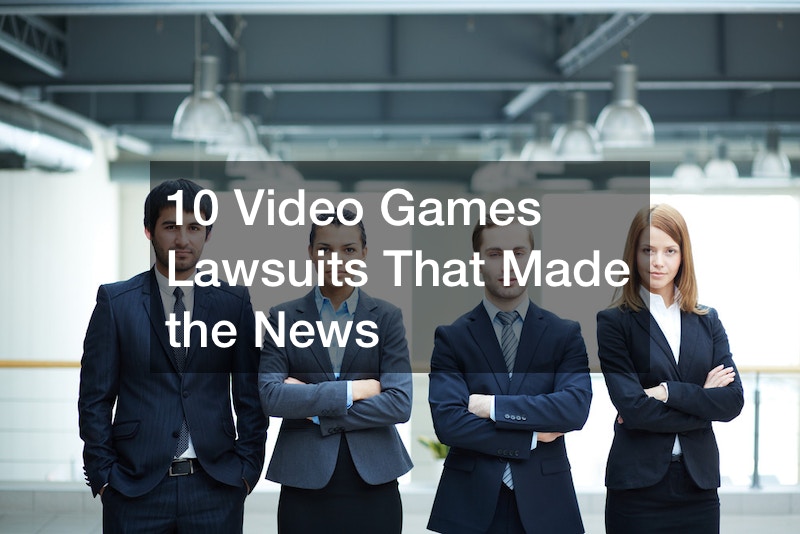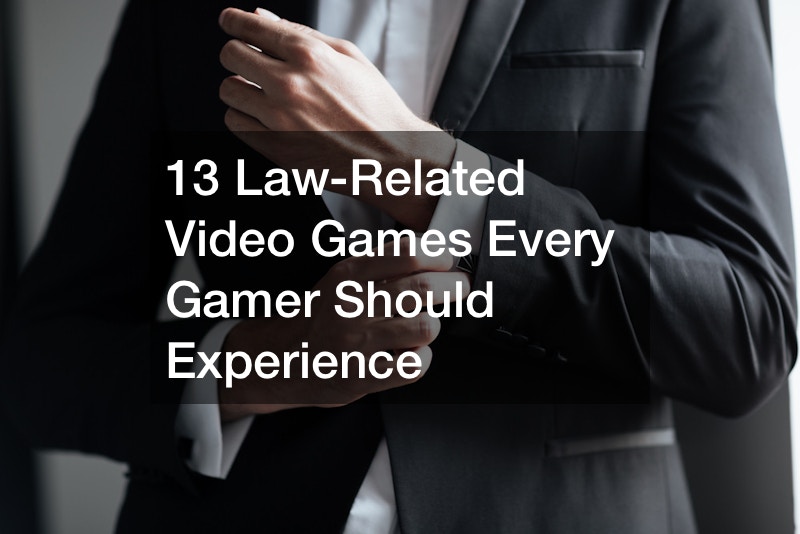As video games have gained popularity over the years, legal issues, including video game lawsuits, have become more common. These issues can range from intellectual property disputes to concerns about the effects of violent video games on minors. The gaming industry continues to navigate these legal challenges as it evolves and grows.
These 10 video games have been subject to legal battles, ranging from concerns over violence and sexual content to copyright infringement lawsuits. As the gaming industry evolves, it will face legal challenges that require careful consideration and resolution.
Grand Theft Auto: San Andreas
The ‘Hot Coffee’ scandal surrounding Grand Theft Auto: San Andreas is one of the recent most notorious video game lawsuits. In 2005, an attorney named Jack Thompson discovered sexually explicit content in the game’s code, which led to a class-action lawsuit against the game’s developer, Rockstar Games.
The game initially received an ‘M’ rating for mature audiences, but the hidden content was not accessible without modification. This led to allegations that Rockstar Games misled the Entertainment Software Rating Board (ESRB) by withholding information about the explicit content.
The ‘Hot Coffee’ scandal sparked a national debate over video game content and led to increased scrutiny of the industry. The controversy ultimately resulted in the game’s rating being changed to ‘Adults Only’ and removed from store shelves. Rockstar Games settled the lawsuit for $20 million and issued a statement apologizing for any offense caused by the game’s content.
The ‘Hot Coffee’ scandal is a prime example of the legal challenges that video game companies can face. Attorneys and activists have continued pushing for greater regulation of video game content, and the industry has implemented new rating systems and content guidelines. As video games continue to evolve and grow in popularity, more video game lawsuits will likely arise, and the industry will continue to navigate legal challenges.
Cyberpunk 2077
Video game fans worldwide highly anticipated the release of Cyberpunk 2077 in 2020, but it quickly became the subject of controversy and legal battles. The game’s developer, CD Projekt Red, was hit with several lawsuits from investors who claimed they were misled about its quality.
The lawsuits alleged that CD Projekt Red made false and misleading statements about the game’s development and readiness for release. Investors claimed that the company failed to disclose the extent of the technical issues and bugs that plagued the game at launch, causing significant financial losses.
In addition to investor lawsuits, law firms worldwide launched investigations into the company’s conduct. The investigations focused on whether CD Projekt Red had violated securities laws by making false or misleading statements about the game’s development and release.
The controversy surrounding Cyberpunk 2077 highlights the potential legal risks that video game companies face when releasing highly anticipated titles. The lawsuits and investigations serve as a reminder of the importance of transparency and honesty in communication with investors and consumers.
Video game lawsuits are becoming more common as the industry grows and evolves. It is essential for video game companies to carefully consider the potential legal risks associated with their products and take steps to minimize those risks. As more law firms and investors become involved in the video game industry, companies must prioritize transparency and accountability to avoid costly legal battles and protect their reputations.

Rune 2
The legal dispute between Human Head Studios and Ragnarok Game LLC over the action-adventure game Rune 2 is another example of the legal issues that can arise in the video game industry. The publisher allegedly attempted to take control of the game’s assets without paying the developers, leading to a lawsuit that eventually settled out of court.
Human Head Studios filed a lawsuit against Ragnarok Game LLC, claiming that the publisher had breached its contract by failing to pay for the game’s development. The lawsuit also alleged that Ragnarok Game LLC had engaged in fraudulent behavior by attempting to take control of the game’s assets without paying the developers.
Lawyers from both parties eventually reached a settlement agreement that allowed the game’s development to continue under a new publisher. The legal dispute surrounding Rune 2 highlights the importance of clear and transparent contractual agreements between video game developers and publishers.
Video game lawsuits can be costly and time-consuming, but they can also be necessary to protect the rights of developers and ensure that they are properly compensated for their work. Lawyers play a crucial role in these lawsuits, advocating for their clients and helping them navigate the legal issues arising in the video game industry.
As the video game industry grows and evolves, more legal disputes will likely arise. Developers, publishers, and lawyers need to work together to develop clear and fair contractual agreements and to take steps to avoid legal disputes whenever possible.
Mortal Kombat
Mortal Kombat, a classic fighting game released in 1992, is one of the most iconic video games of all time, but it also faced several lawsuits for its violent content. One notable case was a lawsuit filed by a father who claimed that the game’s violence caused his son to commit murder.
The case attracted widespread media attention and sparked a national debate about the effects of video game violence. Lawyers for the father argued that the game’s violent content had influenced his son’s behavior and led him to commit the murder.
The case was eventually dismissed, but it had a lasting impression on the gaming industry. In response to the controversy surrounding Mortal Kombat and other violent video games, the Entertainment Software Association (ESA) created the Entertainment Software Rating Board (ESRB), which rates the content of video games and assigns age-appropriate ratings to them.
The creation of the ESRB marked a significant shift in how video games are regulated and helped establish industry standards for content ratings. The ESRB is now widely recognized as the official rating system for video games in the United States and has helped to prevent further video game lawsuits related to violent content.
Lawyers have played a crucial role in shaping how video games are regulated and how legal issues surrounding them are handled. A Lawyer will continue to be crucial in the ever-changing video game business, serving to safeguard the interests of creators, publishers, and players; while also promoting an open and honest marketplace.

Donkey Kong
Donkey Kong, a classic arcade game released in 1981, was the subject of one of the earliest video game lawsuits. The lawsuit was filed by Universal Studios, which claimed that the game’s protagonist, Jumpman (later renamed Mario), was a copyright infringement of King Kong.
Lawyers for Universal argued that the game’s use of a gorilla character and the name ‘Donkey Kong’ were too similar to King Kong, which the studio had exclusive rights to.
Nintendo, the game’s developer, fought against the lawsuit, arguing that the game was significantly different from King Kong and that Universal’s claims were baseless. Nintendo and Universal resolved their legal dispute out of court for an undisclosed sum.
The Donkey Kong lawsuit was a landmark case in the video game industry and helped to establish the legal boundaries for intellectual property rights in video games. It also demonstrated the importance of having experienced lawyers who can navigate the complexities of intellectual property law and protect the interests of video game developers.
In the years since the Donkey Kong lawsuit, video game lawsuits have become increasingly common, with developers and publishers facing legal challenges over everything from violent content to trademark infringement. Lawyers continue to play a critical role in the video game industry, helping to ensure that developers and publishers can operate in a fair and legally compliant manner.
Pac-Man
Pac-Man, one of the most iconic video games of all time, was the subject of a lawsuit filed by Magnavox in 1982. The company claimed that the game’s concept of eating pellets and avoiding enemies violated their patent for a similar game called ‘Blockade.’
Magnavox sought millions of dollars in damages from Namco, the game’s developer, and Midway, its distributor. Lawyers from both companies fought against the lawsuit, arguing that Pac-Man was significantly different from Blockade and that Magnavox’s claims were unfounded.
After years of legal battles, the case was eventually dismissed, with the court ruling that Magnavox’s patent did not apply to Pac-Man. However, the lawsuit had a lasting impact on the video game industry, creating the ‘patent troll’ phenomenon.
Patent trolls are companies or individuals who file frivolous lawsuits against other companies to extract money from them. These lawsuits often have little merit, but they can be costly and time-consuming for the targeted companies.
As a result of the Pac-Man lawsuit, many video game developers and lawyer offices have become more vigilant about patent infringement claims and have developed strategies to defend against patent trolls. Despite the challenges posed by frivolous lawsuits, the video game industry continues to thrive, thanks partly to the efforts of lawyers and other legal professionals who protect developers’ intellectual property rights.

Pong
Pong, the classic video game released in 1972, was central to the first-ever video game lawsuit. In 1974, a competitor of Pong’s developer, Atari, filed a lawsuit claiming that Pong was a copy of their own game, Tennis for Two, developed for a computer in 1958.
The lawsuit alleged that Pong used similar gameplay mechanics and graphics to Tennis for Two and therefore constituted copyright infringement. However, the case was eventually dismissed, as the court ruled that Tennis for Two was not a commercial product and therefore did not have copyright protection.
Despite the case being dismissed, it marked the beginning of a trend of video game lawsuits that would continue to arise over the following decades. As the video game industry grew and became more profitable, legal disputes became increasingly common, with cases involving intellectual property, contracts, and consumer protection.
Lawyers played a key role in many cases, representing developers, publishers, and consumers in legal proceedings. They helped to shape the legal landscape of the video game industry, creating legal frameworks that protect developers’ intellectual property and ensure that consumers are treated fairly.
While video game lawsuits can be costly and time-consuming, they are an important aspect of the industry, helping to ensure that developers can create innovative and engaging games while protecting their intellectual property rights.
Guitar Hero
The lawsuit against Guitar Hero by Gibson Guitar Corporation was one of the most notable video game lawsuits related to trademark infringement. Gibson argued that the game’s guitar-shaped controller was too similar to their guitars and could lead to consumer confusion. The case led to a temporary injunction that halted the distribution of the game, but it was eventually settled out of court, with the terms remaining confidential.
The lawsuit attracted the attention of law firms specializing in intellectual property, who noted that it was an example of the potential legal risks of using real-world trademarks in video games. The case also highlighted the importance of obtaining proper licenses and permissions before including such elements in a video game.
In the wake of the lawsuit, other video game developers became more cautious about including real-world brands in their games, and law firms specializing in intellectual property began to advise their clients on how to navigate trademark law in the video game industry. The case served as a reminder of the potential legal complexities of video game development and the need to seek legal advice from experienced law firms.

Area F2
The case of Area F2 and Rainbow Six Siege is a recent example of a video game lawsuit based on copyright infringement. Ubisoft, the developer of Rainbow Six Siege, claimed that Area F2 was a near-identical copy of their game, with similar gameplay mechanics, weapons, and even maps. Ubisoft filed a lawsuit against the Chinese company Ejoy, which had developed and published Area F2.
This case illustrates the need for strict IP protections in the video game business, where clones and knockoffs are prevalent. This case, which included a Chinese corporation and a French video game producer, also shows the complexity of international corporate law.
Law firms specializing in intellectual property and business law often handle cases like this, where companies seek to protect their trademarks, copyrights, and patents. Such firms provide legal advice and representation in court and can also help companies draft contracts and agreements to protect their intellectual property.
Ultimately, the Area F2 case was settled out of court, with Ejoy agreeing to cease the game distribution. The lawsuit serves as a reminder that video game developers must be vigilant in protecting their intellectual property and may need the assistance of experienced lawyers to do so effectively.
Pokemon Go
Pokemon Go, a wildly popular augmented reality game, faced legal issues related to safety and liability. One of the notable cases involved a worker who was injured while playing the game on the job and filed for workers’ compensation. The incident raised questions about employers’ responsibilities when employees engage in potentially risky behavior, such as playing video games, while on the job.
This case demonstrated the importance of seeking legal counsel, such as a workers’ comp attorney, to navigate the complex legal issues surrounding workplace injuries. While the employer has to provide a risk-free workplace, the employee also must take reasonable precautions while executing their task. In addition to workers’ comp issues, Pokemon Go faced several lawsuits from property owners who claimed that the game’s virtual creatures were causing property damage. These legal challenges underscored the need for game developers to consider potential risks and liabilities associated with their games.
The controversy surrounding Pokemon Go highlighted the need for clear guidelines and regulations in the rapidly evolving world of video games. As technology advances and new games are developed, game developers and consumers must stay informed and aware of the legal issues and implications surrounding video games through the workers comp attorney.
Video game lawsuits have been a common occurrence throughout the history of video games. These lawsuits have ranged from copyright infringement to personal injury claims. Some notable cases have led to the creation of industry-wide changes, such as the creation of the ESRB rating system. Other cases have sparked debate over the responsibilities of employers and property owners regarding video game-related incidents.
Remember, as the video game industry continues to grow and evolve, it is likely that we will see more lawsuits arise in the future. Developers, publishers, and players must stay informed about the legal issues surrounding video games to ensure fair and responsible gameplay.



